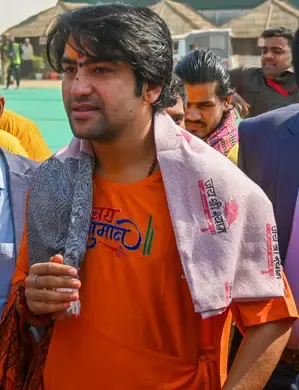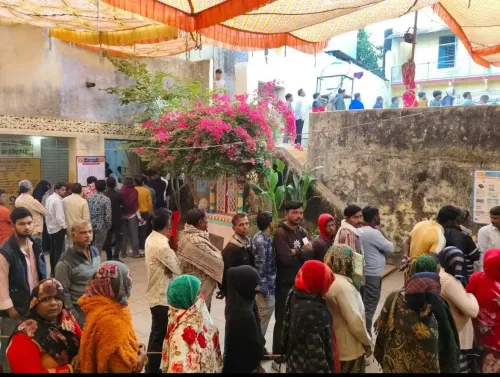Is Animal Sacrifice Justifiable? Dhirendra Shastri Challenges Eid al-Adha Practices

Synopsis
Key Takeaways
- Dhirendra Shastri opposes animal sacrifice.
- Non-violence is essential in modern society.
- Rituals involving harm should be reconsidered.
- Modern alternatives exist for religious expression.
- Every life has inherent value.
Chhatarpur, June 1 (NationPress) The chief priest of Bageshwar Dham, Dhirendra Krishna Shastri, has expressed profound disapproval of animal sacrifice, especially during the Islamic festival of Eid al-Adha, commonly referred to as Bakrid. He stated that no individual has the authority to take a life.
Shastri, who is recognized for his significant spiritual influence, advocated for the adoption of non-violence in contemporary society and called on all communities to transcend rituals that entail harm to living beings.
In a media interaction in Madhya Pradesh's Chhatarpur, Shastri remarked on the tradition of goat sacrifice during Bakrid, asserting, "Violence against any living being is unacceptable across all communities, cultures, and religions. If we are incapable of preserving a life, then no one possesses the right to extinguish it."
He acknowledged that various traditions, including Sanatan Dharma, have historically included animal sacrifice but firmly maintained that such practices are no longer relevant in today's world.
Shastri elaborated that the current era provides more humane and compassionate alternatives for religious expressions.
"We oppose any form of sacrifice, including that associated with Bakrid. Times have evolved. We now have treatments, prayers, and other supportive means. As civilized and educated individuals, we believe that violence against any living being must cease," Shastri stated.
Referring to the fundamental Hindu principle of non-violence, he added, "We must adhere to the path of 'Ahinsa Parmo Dharma', as non-violence represents the highest duty."
In conclusion, he urged followers of all faiths to contemplate the sanctity of life and embrace more peaceful, compassionate practices.
"Eradicating violence against living beings will benefit all religions and inspire a renewed commitment to the belief that every creature possesses the right to live," Shastri emphasized.









